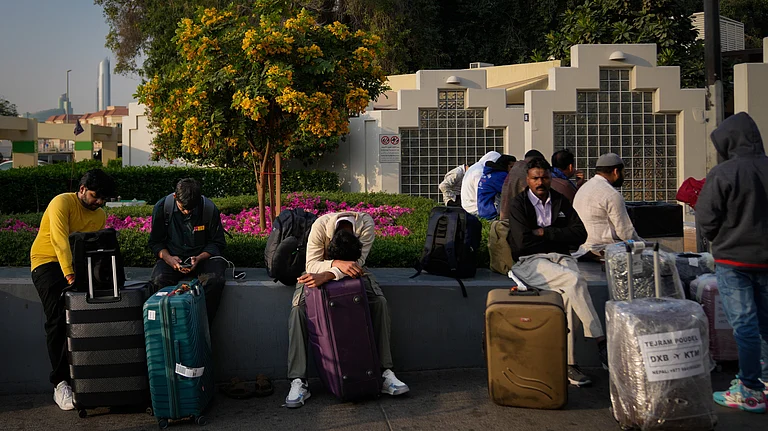IT'S all over bar the counting. That must have been Russian President Boris Yeltsin's thoughts after finally securing the crucial support of presidential candidate and former army general Alexander Lebed.
Lebed, who finished third in the June 16 presidential election with 14.7 per cent of the vote, is perceived as a kingmaker since neither Yeltsin (with 35.2 per cent) nor the communist leader Gennady Zyuganov (32 per cent), have the 50 per cent mandate necessary to stake a claim to the presidency. A run-off is scheduled for July 3.
Immediately after the announcement of the results, Yeltsin sacked defence minister Pavel Grachev and appointed Lebed as secretary of the powerful National Security Council—which oversees the security and police forces—and presidential adviser for national security. After a brief meeting at the Kremlin, Lebed officially endorsed Yeltsin, saying the agreement would "serve not only towards the unification of politicians, but of the forces serving them". Grachev, once described by Yeltsin as Russia's best defence minister, had stood by the Kremlin leader during the hardline coup in 1991 and during the storming of Parliament by Yeltsin's troops two years later.
But if Yeltsin thought that was the end of the story, he was in for a shock. For, soon afterwards, Zyuganov too met Lebed and announced that he did not rule out an alliance with the former general. He said Lebed had been assured that in case he came to power, Libed would still retain the posts given to him by Yeltsin. Earlier, Gennady Seleznyov, the communist Speaker of Parliament, had dismissed Lebed's endorsement of Yeltsin, pointing out: "Lebed has no party behind him, no mass organisation, just a name."
Zyuganov, aware that his party and its allies had not made any gains since the last parliamentary elections, also sought to allay western fears that he would take the country back to the Soviet era by stressing that his government would not be a "communist cabinet". So great are these fears that the European Union as well as the US had openly endorsed Yeltsin's campaign for presidency by warning that funds for Russia might be cut off if Zyuganov comes to power. This endorsement is likely to be reaffirmed at the Group of Seven (G-7) summit next week, prior to the July 3 run-off.
But another surprise for Yeltsin, this time pleasant, came when ultra-nationalist leader Vladimir Zhirinovsky, who finished fifth with nearly 6 per cent of the vote, said his voters would not support the communists in the run-off. Yeltsin is also hoping that the 7 per cent votes garnered by pro-reforms economist Grigory Yavlinsky would come his way during the run-off. But, as Zyuganov observed: "Voters aren't serfs. They simply cannot be transferred to somebody else following their candidate's wish."
The close showing in the presidential elections clearly indicates that the Russian voters are polarised between Yeltsin's painful reforms and the stricter controls that marked the Soviet regime. But though Yeltsin is clearly disliked by many for his autocratic manner and his apparent indifference towards the hardships faced by the common man, he is seen as the lesser of the two evils because they fear losing some of their new freedoms if the communists return to power. Yeltsin is also blamed for the bloody war in breakaway Chechnya.
However, O.N. Mehrotra of the Institute for Defence Studies and Analyses feels that while Yeltsin has an edge because of Lebed's and Zhirinovsky's support, the voters who backed the general and the ultra-nationalist may not switch allegiance quite so readily. Lebed, he says, won the support he did by promising a harsh crackdown on corruption and crime, both of which skyrocketed during Yeltsin's tenure. In fact, the strong communist showing was due to an anti-Yeltsin vote. While Yeltsin has openly misused the media and his office to woo voters, the G-7 endorsement just before the run-off is unlikely to make much of a difference since most of the pro-reform voters had voted for him in the first place, Mehrotra adds. He also notes that the turnout will be a key factor—a higher turnout will bolster Yeltsin's support. As for ties with India, he says that if the communists come to power, they would definitely improve—although Yeltsin too has been making friendly overtures towards New Delhi.
Another factor likely to boost Yeltsin's chances is that the independence fighters in Chechnya have announced that they will extend their ceasefire—signed on June 10—till the end of the run-off "so as not to risk the resumption of hostilities". However, "whether Yeltsin or Zyuganov wins, it's all the same to us," added rebel leader Aslan Maskhadov. "Russia's Chechnya policy will remain the same, they will only make peace when they realise there's no other solution." And so it is with the Russian voter: are both leaders one and the same to him or not? This time he will have to decide.

















